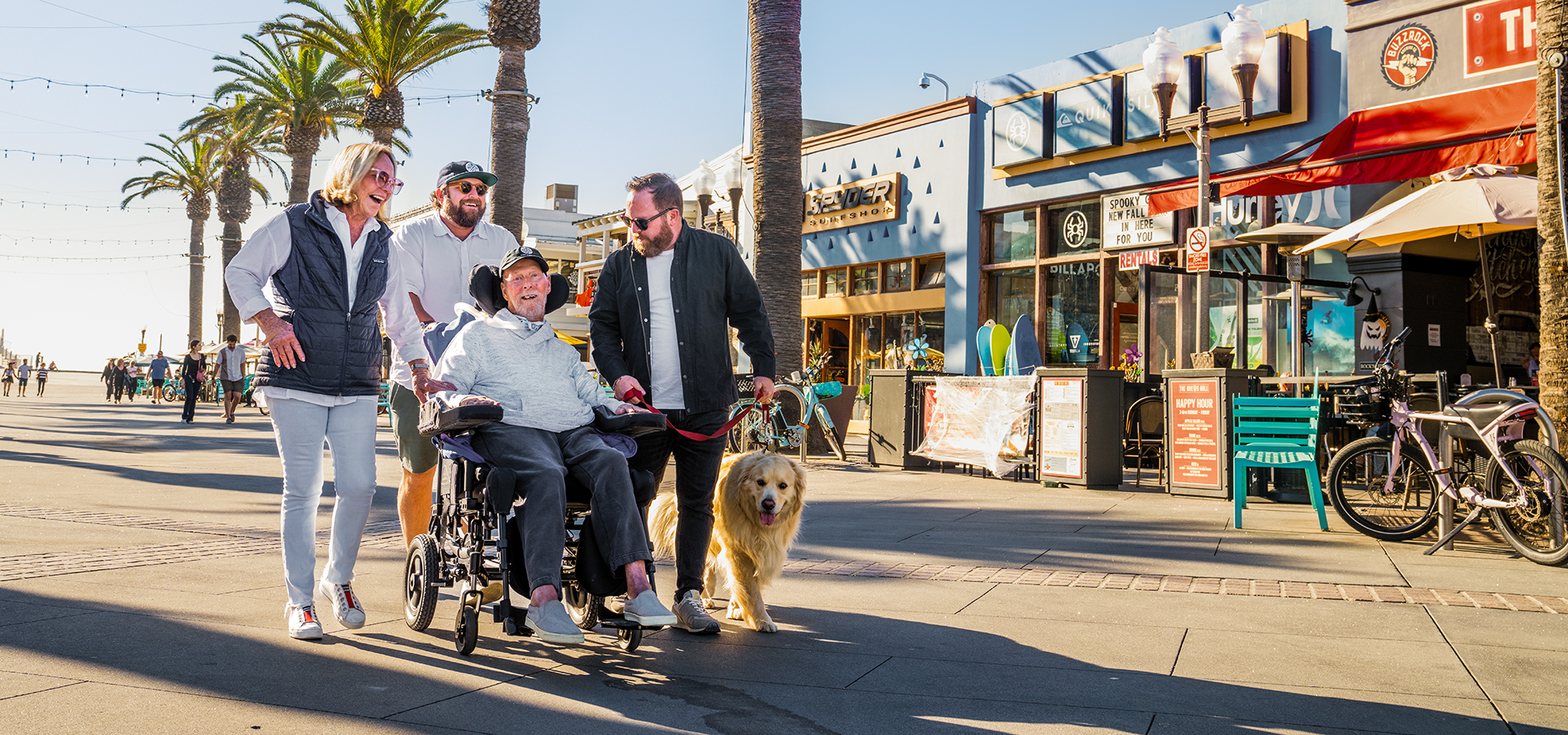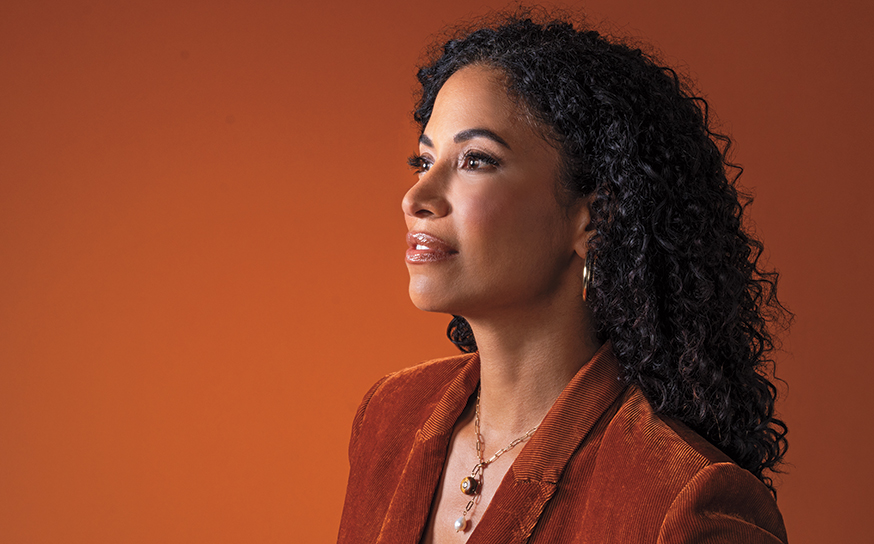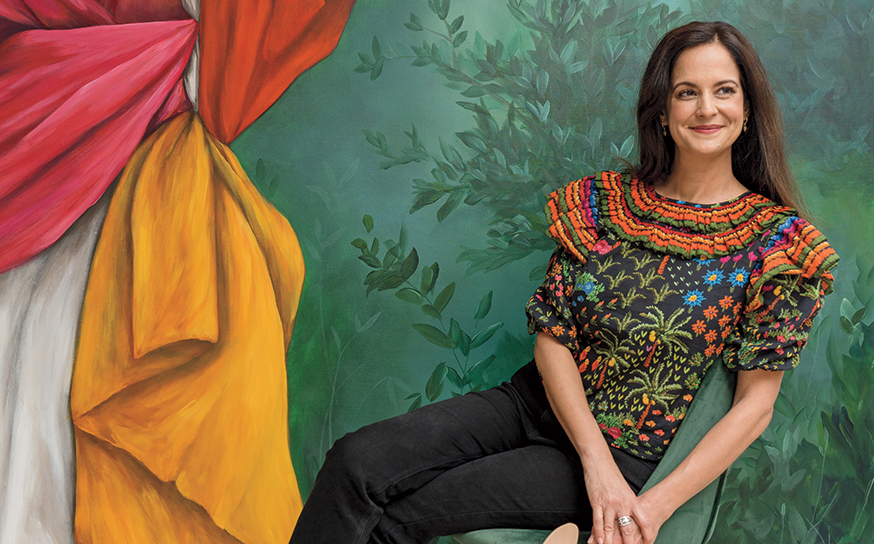After West Nile Virus Left Larry Wolf Paralyzed, He Could Have Easily Withdrawn. Instead, He Doubled Down on Living
Without limits.
- CategoryPeople
- Written byAmber Klinck
- Photographed byShane O’Donnell
Occasionally, if you’re lucky, you cross paths with someone who seems larger than life—the kind of person everyone gravitates to, the one with great stories who figured out early that life’s too short to not live it well.
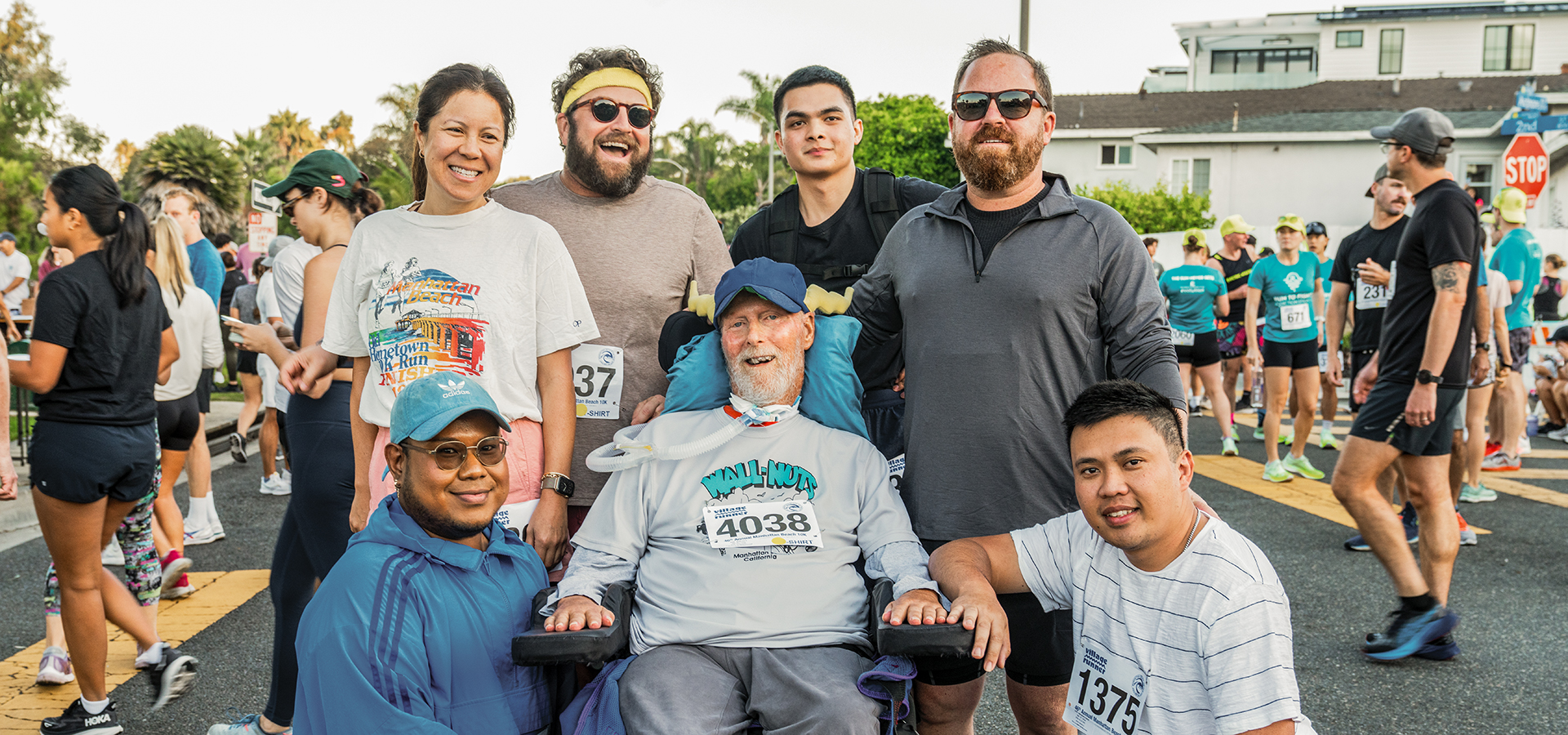
There are a lot of ways to introduce Larry Wolf. First and foremost, he’s Lynn Wolf’s husband. He’s dad to adult sons Tyler and Alex. He’s a real estate legend, the former co-owner of Shorewood Realtors. He’s a philanthropist and a true martini aficionado. He’s also a survivor who has spent seven years learning how to live with the paralyzing repercussions of contracting West Nile virus.
While none of these titles individually define who Larry is, his character and determination—during all the incredible highs and devastating lows—do. It’s when life gets hard that we find out who we really are, and Larry has certainly risen to the occasion.
Originally from Chicago, Larry studied aeronautical engineering at the University of Illinois. After graduation, the big topic of discussion between Larry and his roommate, Etty Andreani, was whether their next adventure would take them to Seattle or Los Angeles.
“[Etty] wanted to go to Seattle, and I wanted to go to L.A. We debated for months,” Larry notes. “One night I went to bed and thought I would get up in the morning and tell him, ‘OK, you win. We’ll go to Seattle.’ But before I could open my mouth, he said, ‘You win. We’re going to L.A.”
Etty didn’t learn until months later how close the duo had come to moving to Seattle. But considering that Etty still calls Manhattan Beach home and Larry still considers Etty one of his closest friends, it looks like everything worked out alright.
When Larry first arrived in Los Angeles, he moved around a lot—bouncing from Santa Monica to Long Beach and Playa del Rey. But he liked to party in Manhattan Beach. “I finally moved here in 1965. I knew this was where I wanted to build my life,” he says.
In 1970 Larry met the Manhattan Beach girl he’d build that life with, but they were both far from home. “We were walking through Mammoth Lodge looking for a place to sit down because it was jammed,” Lynn notes. “It was New Year’s Day. A girl in my group knew a girl in his group and they said, ‘Come on.’ I ended up sitting next to Larry. Later he said he thought I was cute and that I was G.D., which is ‘geographically desirable’—because I lived in Manhattan Beach too.”
Lynn’s first impression of Larry varies depending on who you ask. She smiles and says she can’t remember who he was when he called her after they both returned home from Mammoth. Larry quickly says that’s bullshit, and Alex agrees with his dad.
“Yeah, that is bullshit,” Alex laughs. “She always says that he was a huge nerd, but she couldn’t get him out of her head.” Regardless, the two had their first date at “Pancho’s or something” … they can’t remember. And in 1972 they were married.
When the couple first met, Larry was an aerospace engineer. “I worked for Douglas and then Hughes,” he notes. But he had other aspirations. Larry saw a future in real estate.
“He said, ‘I know this little place called Shorewood. I’m going to ask if they’ll take me on part time,’” Lynn remembers. “And so Larry started working part time at night for Shorewood Realtors while he was still working full time with Hughes.”
When his part-time gig started paying more than his full-time job, Larry knew it was time to make the transition into real estate officially. He hit it off immediately with Shorewood’s founder, Arnold Goldstein.
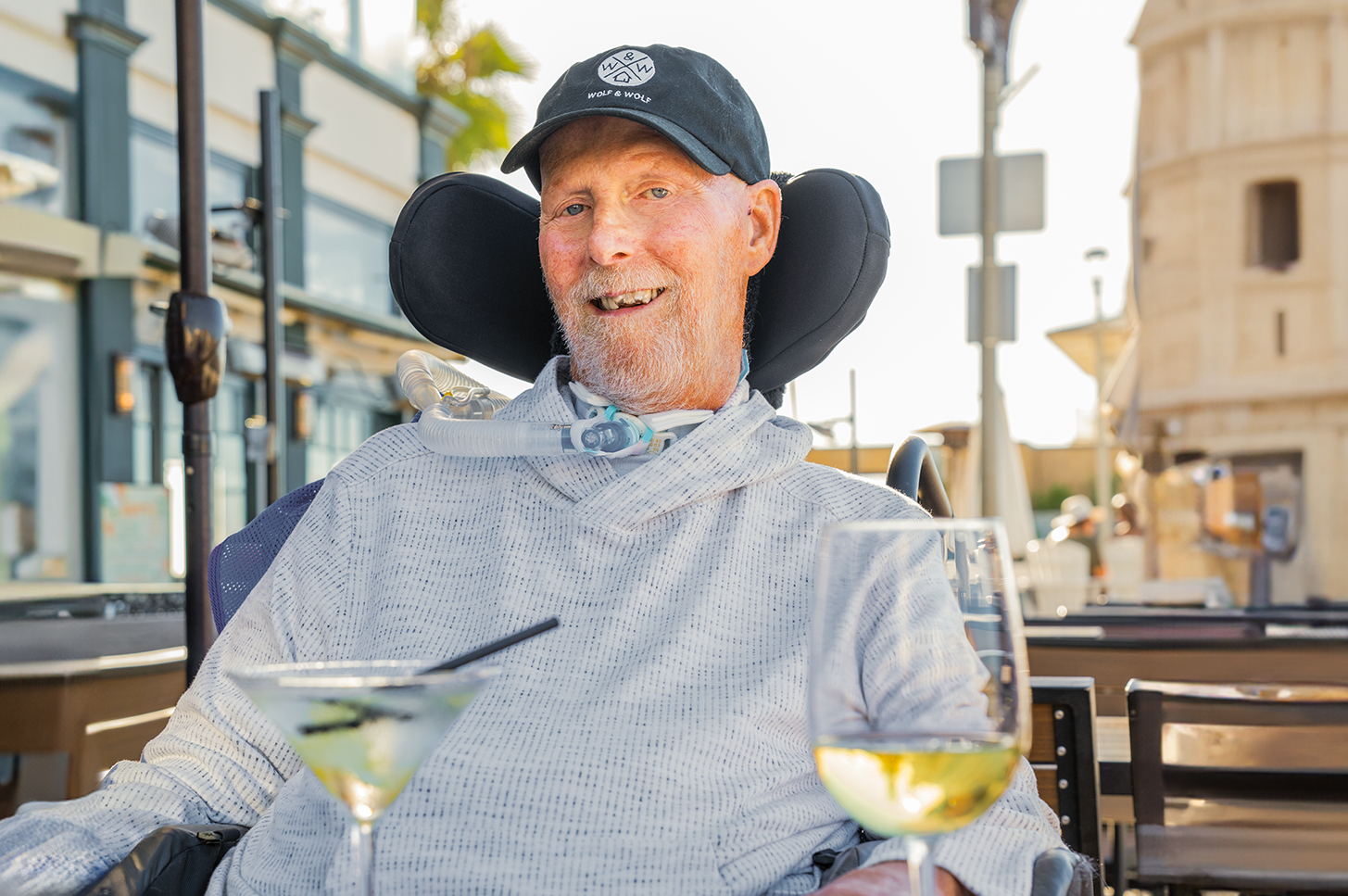
“The thing I have learned since I’ve been home is that being confined to a wheelchair is a handicap, not a death sentence. I try to take advantage of all the little joys in my life, like seeing my granddaughters, visiting with friends, reading a good book, seeing a good movie.”
Shorewood was filled to the brim with talent. “It was like lightning in a bottle,” Alex notes. Larry was on fire, and like anyone who reaches a certain level of success, he started thinking about what was next. “I wanted ownership,” he says.
So he positioned a partnership with Arnold, and in 1979 Larry became co-owner of Shorewood Realtors. Together Larry and Arnold took the company to new heights, expanding the number of agents and Shorewood’s reputation to impressive levels.
“I would say Shorewood was his firstborn,” Alex says. “He loved everybody at that company so much,” Tyler notes. “He still does.”
Through his relationships at Shorewood and his philanthropic ties to local organizations like the Rotary Club of Manhattan Beach and Richstone Family Center, where Larry has served on the board of directors for over 20 years, he frequently saw familiar faces when he and his family were out in their small beach community. “My dad’s nickname was Mr. Mayor because anytime we’d sit down for dinner somewhere, five or six people would come over and say hi,” Alex shares. “Everyone knew who he was.”
Because of Shorewood Realtors’ status as a long-standing and respected South Bay institution, many community members were surprised to hear that Larry and Arnold were selling the company to Denver-based Realtor Roger Herman in 2014. But for Larry, the timing seemed right—both for him as well as for the future of the company.
“I had been working my butt off for over 40 years. I just felt it was time. There were other things I wanted to do. We weren’t actively looking to sell, but the opportunity came along and we jumped on it. Unfortunately, we picked the wrong guy to sell to,” Larry says.
“The goal was to take it to a more national level,” Alex notes. “[Roger] owned real estate brokerages across the U.S., and he was going to change them all to Shorewood.”
Two years later, in 2016, the new owner filed for bankruptcy. “It sent a shockwave through the community. It affected so many people,” Alex notes.
It was a devastating blow to the family. “It just happened so fast. I have a very positive outlook on most everything so I was still feeling like it would be OK, that we could still fix it,” Lynn says. “But we all know how it ended. We were heartbroken. The agents and affiliates are like family. We worked together for 40 years to build this great company and community. We wanted the best for them. We still do.”
Larry tried to remain positive. He had spent decades tirelessly growing Shorewood Realtors and, despite it all, was excited to shift his priorities to more simple pleasures. Together he and Lynn had a lot to look forward to.
Over September and October 2016, Lynn and Larry traveled to Italy, to their home in La Quinta for the Desert Trip music festival, and to Napa for a golf getaway. “Coming home from the last trip, we were on a small plane, and I could see he wasn’t feeling great,” Lynn says. “He was going out that night with his running group, The Walnuts. He said he probably wouldn’t stay out late. He came home about an hour later.”
Larry was exhausted. He wanted to sleep, and he wasn’t moving well. “We didn’t know what it was,” Lynn says. The following morning, she reached out to Tyler and Alex. “I called the boys and told them, ‘I think we should go to the hospital; something’s wrong.’”
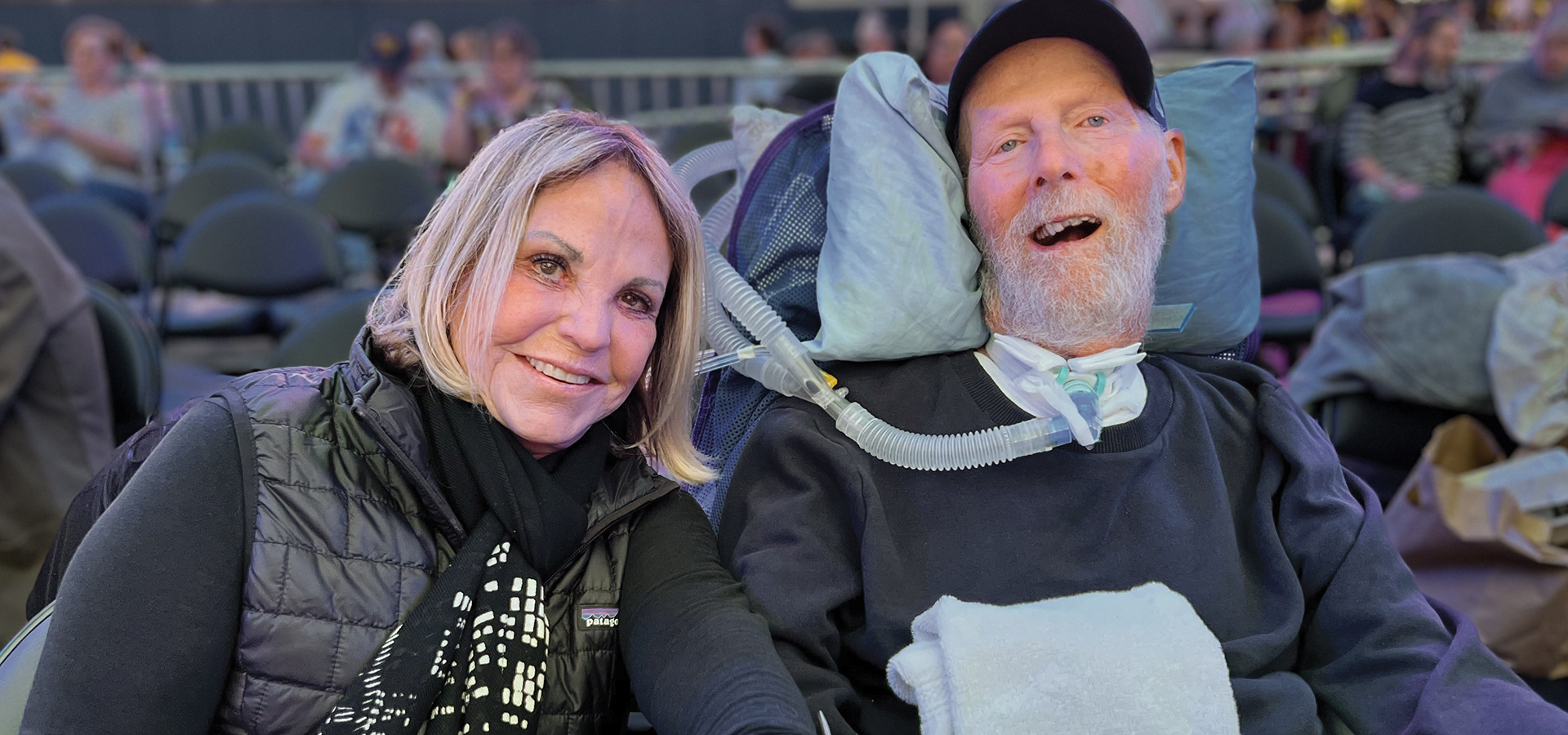
After a couple hours at the hospital, Larry was released and everyone went home. Later that evening, Lynn called the boys again. Larry wasn’t doing well. When they walked into their family’s home, there were eight paramedics upstairs with their dad.
“We took him back to the hospital, and at that point his temperature had gone up several degrees. I remember them pointing at the fever and saying, ‘That’s our sign that there’s something bigger going on,’” Alex says.
Days passed before the family was told Larry’s diagnosis. “By the time we found out he had West Nile virus, we’d already been through the wringer,” Tyler says. “We were sleeping in hospital waiting rooms. He had already been intubated. A coma had been induced. We just needed to know what it was.”
According to the U.S. Department of Health and Human Services, West Nile virus is the most common mosquito-borne disease in the continental United States, with a median of 2,205 cases reported each year. Approximately 80% of people infected with the virus will not have any symptoms, and about 20% will experience a fever and other flu-like symptoms. Less than 1% will develop severe West Nile neuroinvasive disease, a condition that can lead to death or long-term disability and for which there is currently no available treatment or vaccine.
A doctor told Tyler: “The chances of a case this severe are much lower than winning the lottery or being struck by lightning.”
It would be weeks before Larry woke up. He was now in a different hospital—he had been moved from Torrance Memorial Medical Center to the Ronald Reagan UCLA Medical Center—with no real understanding of what was happening to him. “At that point, there was no mobility,” Tyler notes about his father. And because Larry was on a breathing machine, he was unable to speak.
The family had a whiteboard with the alphabet written on it, just waiting for the opportunity to use it. When Larry woke up, they went row by row waiting for any sign before stopping at a letter. “It was based on him blinking his eyes or moving his tongue,” Alex says.
The first word Larry spelled was stroke. “I remember specifically saying, ‘Your body didn’t do this to you. Something did this to your body.’ That was the beginning of the next seven years,” Alex says.
“I didn’t know what to make of it,” Larry says of his West Nile diagnosis. They were grateful to know what they were up against, but a diagnosis also meant Larry could no longer stay at the hospital. The family now faced a new challenge: finding a long-term acute care facility.
“Most places said, ‘We can wean you off the ventilator.’ But once it became clear that wasn’t going to happen, they told us we had to leave,” Tyler notes.
During the process, Lynn was referred to Topanga Terrace Rehabilitation and Subacute. The facility served as a welcome solution for more than three years. Lynn drove two hours each way nearly every day to be with Larry. The family made it a home away from home—celebrating birthdays, sneaking in beers and watching football. There was even a wedding.
“Etel and I had a big wedding party at my parents’ house, but we actually got married the day before at Topanga Terrace,” Tyler says. “That’s the day we celebrate our anniversary.”
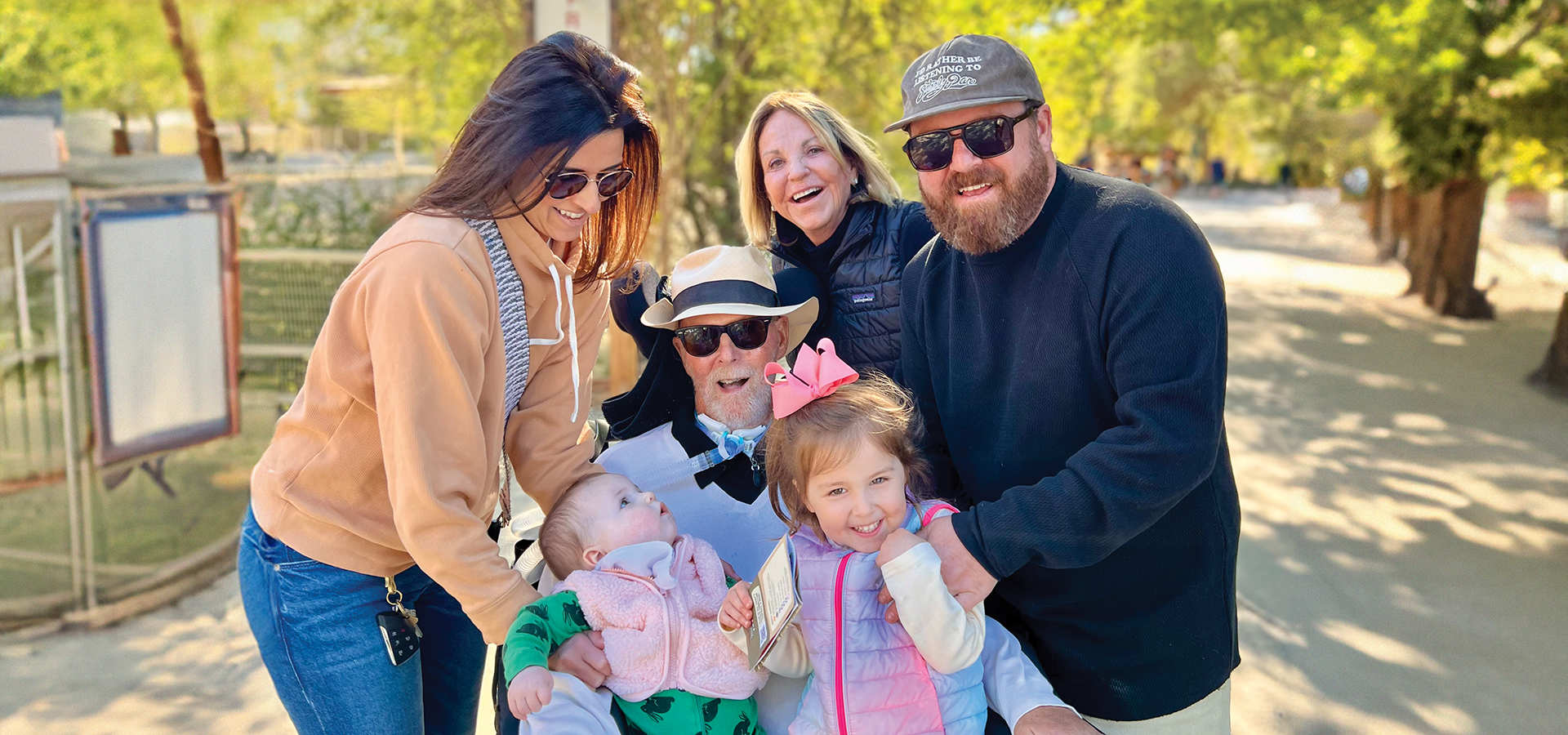
Then COVID-19 happened. During the early days of the pandemic, nursing homes were hit hard. The family went from having unlimited access to Larry to getting a 72-hour notice that the facility was about to go on lockdown. In reality, the family—as well as the caretakers they had come to rely on—would lose access to Larry within 24 hours.
Because of Larry’s paralysis, he required around-the-clock care. But it’s important to note that while he is physically handicapped, his mind is as active as ever. Cutting him off completely from his family—from any human interaction—would have been like a mental prison.
“They rolled him up to a window, and we’re looking at him and he’s looking at us. He says, ‘Get me out of here,’” Lynn remembers. “I hadn’t seen him cry in 3½ years, and that day he was weeping,” Alex notes. “Alex stood at the door and said, ‘You’ll be home in 48 hours,’” Lynn says.
Bringing Larry home had never seemed like a plausible solution, even to Larry. “I thought I was so limited,” he says. But keeping him in isolation was not an option.
Within days, the family transformed their living room into a hospital room. This was no small feat. “We have a family of caretakers who split up 12-hour shifts throughout the week,” Alex notes. For everyone involved, this kind of at-home care was uncharted territory. But once the decision was made, there was no room for hesitation.
After more than three years, Larry was finally home. He describes that moment as “pure joy.”
That day and every day after, Larry’s world has gotten bigger. Not because he’s overcoming the virus that left his body paralyzed, but because of his willingness to test the limits. When Larry came home, it raised the question: What else can he do? Enjoying a stroll on The Strand, taking Lynn to dinner, participating in the Manhattan Beach 10K … so many things went from I can’t to Why not?
“The thing I have learned since I’ve been home is that being confined to a wheelchair is a handicap, not a death sentence,” Larry says. “I try to take advantage of all the little joys in my life, like seeing my granddaughters, visiting with friends, reading a good book, seeing a good movie.”
Of course, none of this works without the unwavering strength and support of his family and caregivers. “I am blessed to have the caregivers I have,” Larry notes. “They are part of our extended family and we have become really good friends. Most of them have been with me from the beginning, and I greatly appreciate their loyalty and the great work they do.”
Larry is still on a breathing machine. “We haven’t heard his voice since October 2016,” says Alex. “The main way we’ve communicated with him over the years is by reading his lips, which we are still trying to perfect.”
“For Alex and me, it was about seeing my mom not give up. And for my mom, it was about seeing my dad not give up,” Tyler notes.
“I can’t emphasize enough how much I’ve relied on the boys,” Lynn adds. All of their lives changed that October in 2016, but they decided early there was nothing they couldn’t get through as long as they did it together.
“This is not a miracle story,” Larry says. “I don’t have any special powers or strengths. I just refuse to give up. If there’s a message in this story to other people who are in the same situation, it’s ‘Don’t let anyone set your boundaries. Set them yourself.’ I don’t know how long I can keep doing this, but I’m sure as hell going to try.






